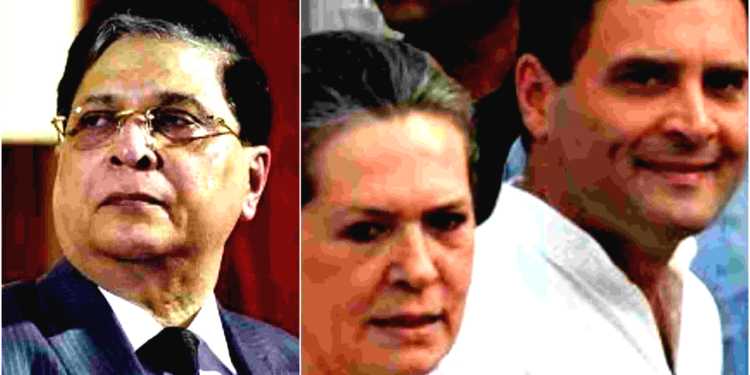The Congress has a history of interfering with the judicial setup. Indira’s taming of the judiciary was probably the biggest judicial crisis that we ever faced. The suppression of the then Justice H.R. Khanna is just an example of how the Congress mishandles judges who refuse to toe its line and rewards those who are supportive of a Congress government. Another example is the abstinence by the Congress while voting on an impeachment motion against the then Justice Ramaswami. The Congress has again started to politicize the judicial setup. This time it has initiated the process of introducing an impeachment motion against the sitting Chief Justice of India Dipak Misra.
The Congress is trying to stifle the judiciary only due to its ideological issues, with no apparent manifestation of misconduct by the holder of such an important constitutional office. The talks of CJI Dipak Misra’s impeachment were going on for quite a while, and now, according to multiple news reports and opposition sources, the Congress has formally kick-started the process and several opposition parties seem to have joined it.
Going by the version of the opposition parties, it is introducing the impeachment motion on the basis of the judicial turmoil triggered by the press conference held by four senior Supreme Court judges in the month of January. The judges had alleged that the current Chief Justice was indulging in favouritism and misusing his authority as the ‘master of roster’. According to them, all the crucial cases were assigned to other judges without any regard to seniority among the judges. However, one is baffled by the kind of political opportunism shown here. The fact remains that the Chief Justice of India is the sole authority to decide on the allocation of cases among the judges of the Supreme Court, and as such there was no concrete evidence of prejudice against sitting Chief Justice Dipak Misra.
In an ideal world, the judiciary should have been allowed to sort out its internal issues, but the opposition had other plans. It soon started diverting the issue as a ‘danger to democracy’ with sitting Chief Justice Dipak Misra as the principle villain.
The politicization of the whole issue is evidenced by the suspicious meeting between the left leader D. Raja and Justice Chamleshwar (one of the four judges who held the press conference). Raja was caught by television cameras leaving the judge’s house from the backdoor hours after the press conference. Raja thereafter opined that “Parliament cannot remain a mute spectator”. The chain of events suggests that the Congress and its ecosystem tried its level best to make a political issue out of the unfortunate event. Even though the CPI distanced itself from the objectionable meeting, it seems like a mere excuse. It might be a political tactic to send a leader to gather political mileage out of the turmoil and then dissociate themselves from the meeting.
Now, that the opposition’s attempt of politicizing the judiciary’s internal issues is out in the open, one needs to analyze the reason behind the Congress’ pressing for an impeachment motion against CJI Dipak Misra.
Prima facie, the reasons that come into mind are the ideological issues with the Congress and its associated support system. It fails to accept Justice Dipak Misra at the helm of affairs because he seems to be an independent judge who does not align to a particular ideology. The opposition parties started maligning the sitting Chief Justice from the day he passed the order mandating the playing of the national anthem in movie halls. The proponents of the ideology that has started lending support to anti-national elements got furious over this order and started to project the Supreme Court order as some sort of a draconian pronouncement.
Before his appointment as the Chief Justice of India, several mainstream media outlets known for having certain political inclinations started showcasing Justice Dipak Misra as a conservative judge having a history of curbing fundamental freedoms and liberties. Congress’ enmity towards the Chief Justice of India intensified further after one of its senior leaders and a Supreme Court advocate, Kapil Sibal, failed to get the relief they were seeking in the Ram Mandir dispute before a three judge bench headed by CJI Dipak Misra.
Kapil Sibal was one of the advocates appearing for the Sunni Waqf Board and had prayed for the postponement of the hearing on the matter on the ground of massive political ramifications that could be triggered by a ruling on the dispute. However, the Supreme Court rejected this prayer outright and the bench observed that it was the respondents who had sought an early hearing in the matter in the first place. The bench also stated that the respondents were non-serious. Even though it seems that Kapil Sibal has been recused from the matter as elections near, the Congress has exposed its intentions by going after the Chief Justice.
Judicial independence is part of the basic structure of the Constitution of India. In fact, the Constitution has made a specific provision for the separation of the judiciary from the executive. The provisions for impeachment are only a check on the powers of the judges and not a weapon in the hands of the legislature to settle scores or to take sides between judges in case of internals issues within the judiciary. The process of impeachment must be resorted to only when it is absolutely necessary. In fact, there has not been a single successful instance of a judge’s impeachment. The Congress has damaged the healthy convention of keeping the judiciary and politics separate by politicizing this serious issue. Such a process must not have been initiated in absence of any clear and cogent evidence.























